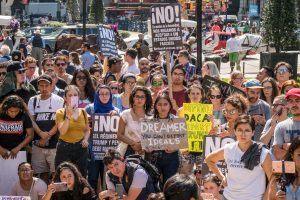By Robin Happel

On a crisp September day in 1973, Chile’s presidential palace burned in a C.I.A.-backed military coup. For years prior, American agents had attempted to corrupt Chile’s electoral process, surmising that President Salvador Allende would be bad for U.S. business interests. This month marks the anniversary of Allende’s death and of the American intervention that set the stage for the brutal Pinochet regime, a dictatorship that lasted until 1990 and which has divided Chilean politics to this day.
Current President Michelle Bachelet was one of many children who watched her family disappear into Pinochet’s secret prisons, and was also one of the lucky few who survived to serve her country. She was forced to flee through no fault of her own, but became an exile in a world all-too-often indifferent to the suffering of the stateless. Stories such as these are seldom taught in American schoolrooms. Taking a solipsistic view of history, we prefer to view immigrants as drawn to the American dream, rather than running from the parts of our past we would prefer to forget. Arguments for continuing DACA, for amnesty, for passing the DREAM Act have often centered on platitudes, or on the over $215 billion that DREAMers contribute to the U.S. economy. And, while it is true that no human being is illegal and that immigration is a human right, we must not forget that our most often overlooked duty is, perhaps, to our own past. In addition to valuing undocumented immigrants as individuals, we must also force ourselves to see the broader trends we usually turn away from, the ways in which illegal immigration is not an individual decision so much as an outgrowth of imperialist policy. It is wrong to blame children for their parents’ choices not simply by virtue of their age or accomplishments, but also because their parents’ choices were likely not wholly free, but instead forced by circumstance.
Refugees are not criminals, but rather a reflection of decades of America destabilizing democracies around the globe, from Mosaddeq to Montt, Pershing to Pinochet.
In short, should the same nation that bombed Guatemalan villages in 1954, staged a coup leading to guerrilla war and later funded genocidal dictator Rios Montt turn away Guatemalan refugees? Should a country sanctioned by the U.N. for using mines on civilians in Nicaragua bear no responsibility to their descendants? Should we not shelter those fleeing secret police the C.I.A. trained? America First was the drumbeat that drove the Banana Wars, the brutal occupations and colonial extraction of the 1920’s and 1930’s across much of Central America; it cannot also be the mantra of denying responsibility for refugees from the same region. Such isolationism is anathema to Iran-Contra, to the Pentagon Papers and to all the myriad mistakes of America’s imperialist past.
We must defend DACA and demand the DREAM Act not only for the sake of our fellow students and friends, but also for the sake of America itself, and for our own vision of ourselves. We must decide whether we want to be a world power, a polestar for the best and brightest beyond our borders or a nation of walls, isolated, circling ever inwards. We owe much more to undocumented immigrants than to pretend they have no place here, believing that there shouldn’t be a pathway to permanent citizenship for those displaced by poverty, or by violence tied to America’s past policies or ongoing drug war. Rather than rooting amnesty arguments in charity alone, we must also acknowledge that we owe immigrants a great debt, both economically and socially, in a nation that has historically been strengthened by diversity. Together, we can learn from the mistakes of the past.
Like the ‘No’ campaign that peacefully ousted Pinochet, or the work of civil rights lawyer Leonard Weinglass, who fought for freedom of the press in the Pentagon Papers trial and many others, we can achieve real change by refusing to accept the unacceptable, by organizing and protesting peacefully. El pueblo unido jamás será vencido. The people united will never be defeated.
Robin Happel, FCRH ’19, is an environmental studies major from Jonesborough, Tennessee.






































































































































































































